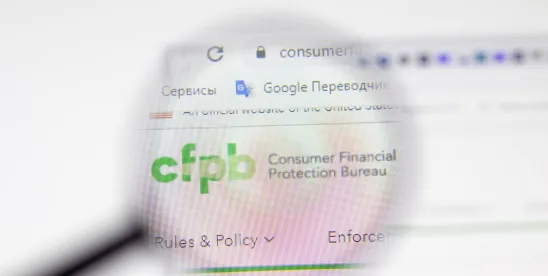On April 17, the CFPB issued a consent order against a San Francisco-based for-profit coding school and its and CEO, banning it from lending to consumers, after it found that the company inflated its job placement rates to students and deceived them about a tuition financing program.
The company provides short-term, six- to nine-month training programs in areas such as web development, data science, and backend engineering. To finance its $20,000 tuition, it advertised to students what it termed “loan free” income share agreements (“ISAs”) where students could attend the school if they agreed to pay a percentage of their monthly income from a qualifying job after they graduate. Nearly all company students funded their enrollment with ISAs and students would end up paying about $30,000 of their future income to the company under that arrangement.
The Bureau’s investigation found that:
- The company and CEO made false representations about the ISAs and the benefits students would receive if they entered them, including (1) that the agreements were not loans and carried no finance charge, (2) that the school’s interests were aligned with its students’ interests because the school got paid only when students got a high-enough paying job, and (3) that the school had high job-placement rates and a top-notch curriculum and instructors (its placement rates were around 50% instead of the 71% it told students). The Bureau’s investigation found that students were charged an average of $4,000 in finance charges and they were forced to repay the entire $30,000 if they missed a payment.
- The company violated the Truth in Lending Act and its implementing regulation, Regulation Z, by failing to disclose key facts about its financing agreements, such as the amount financed, finance charge, and annual percentage rate.
- The company violated the Holder Rule by failing to include a provision in its financing agreements making any holder of the agreement subject to the legal claims that students could assert against the company. In fact, the CFPB found that the company quickly sold many of the agreements to private investors and made money regardless of the students’ success, despite its claims that it would not get paid until students did.
The Bureau’s order permanently bans the company from all consumer-lending activities and bans the CEO from any student-lending activities for ten years. The company issued around 11,000 ISAs between 2017 and when it shut down the program this year.
The consent order also rescinds ISAs for graduates who have not had a qualifying job in the past year; reforms ISAs to eliminate the finance charge for consumers who graduated the program more than 18 months ago and obtained a qualifying job making $70,000 or less; and gives current students the option to withdraw from the program and cancel their ISAs or continue in the program with a third-party loan or lawful ISA. The order also requires assessed a $64,235 civil money penalty on the company and a $100,000 civil money penalty on its CEO.
Putting It Into Practice: This is the second ISA settlement in the last six months (see our post here) and the Bureau’s position vis-à-vis ISAs and how they are marketed is increasingly clear. ISA providers should understand that federal and state regulators can view these products as being subject to TILA and state usury laws, and will focus on how ISAs are marketed and sold to students for UDAAP violations. Given the recent activity, companies offering similar financial products, including ISAs, should review this latest settlement agreement to see if their products, and how they are offered, may fall within similar regulatory scrutiny.



 />i
/>i

